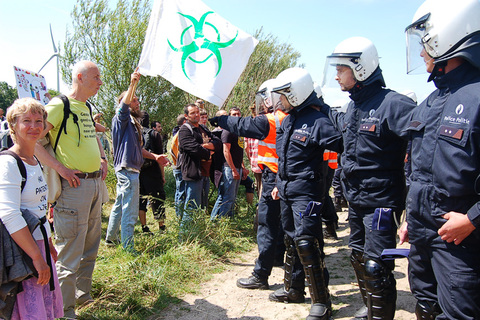On their Dutch and French language blog, organizers of the Field Liberation Day action in Wetteren, Belgium declared their success. They also published a multi-lingual dossier on the GM potatoes here, English is mixed in with other languages.
On the 29th of May about 500 people gathered at the trial fields. A broad mix of people including professionals, scientists, farmers, young and old.
Standing between them and the potatoes were about 60 police officers dressed in full riot gear prepared for battle, a 2 meter high fence, razor wire and electronic sensors.
As the demonstration progressed about half the participants, 250 or so, penetrated the barrier and entered the trial fields. There were about 30 arrests, and prosecutions are expected to follow.
While the fields sustained about 20% damage on the day of the action, some participants returned in the days following to continue damaging the fields.
Civil action is expected against the demonstrators, as the multinationals behind the trials claim financial damages.
The demonstrators are now looking to build a support network; including moral, legal, logistical, financial and other help. If anyone reading this would like to participate, let me know and I’ll make sure you’re in contact with the right people. I think you can also probably contact them via their blog I linked to above.
Bees
One of the things uncovered by demonstrators were beehives kept 30 meters from the potato trial fields. A glimpse of this is shown in the last few seconds of the second video.
University Researcher Fired
A few days following the action in Wetteren, academic researcher Barbara Van Dyck was fired by the Catholic University of Leuven . She wasn’t fired because she trespassed, damaged anything or broke any laws. She was fired because she was present during the demonstration, outside of working hours on a Sunday, and voiced her public support. She was fired for performing what in many places in the world are constitutional rights.
Just in case any of us thought universities were places of free thought and expression, now we all know we were wrong.
Regardless of your personal views on the Field Liberation Day, please consider signing the petition to ask for her reinstatement and sending an email to the University. Details can be found here.
Free Expression
So much of what happened on May 29th comes down to freedom of expression and proportionality of actions.
Sixty police in riot gear? If I ever had problems with vandalism in my garden, even if I knew who it was and had dates and times in advance, I would never get the attention of the police here. It doesn’t matter if I had a breeding project, or if I had years of time an effort invested into what I was doing. It’s also not just me as an individual, but we have the same problem at my community garden complex where we have 50+ gardens, problems with vandalism, and the police won’t do anything about it.
If I were to grow something provocative, for example marijuana (which is permitted here in small amounts), and my garden was overrun with 19-year old stoner-vandals, I might even get into trouble with the police for creating problems.
What’s more provocative than a field of GM potatoes? The people behind the planting of the field are as much or more to blame for it’s destruction than the demonstrators themselves.
There isn’t any court in the Netherlands that would award me more than market value if a field of potatoes in my garden were destroyed by vandals and I sued for damages. It doesn’t matter how much work I put into growing and possibly breeding them. Face it, even if you could find someone who wanted to buy and eat them, the potatoes aren’t worth more than 50 cents a pound. What’s this talk of civil action…arrests and prosecution…over potatoes?!
This is very much the same logic of Monsanto suing farmers like Percy Schmeiser when their crops become contaminated with GMOs, and it’s abuse of the justice system and civil courts.
Anyone reading this who has ever had a garden or farm knows that, however distasteful it may be, destroying someone else’s plants and the work behind them is mindless and no problem at all. Build a wall and block the light. Enter at night and pull the plants up. Throw salt on them. Spray them with herbicide. Pollute the genetics of wild crop relatives with GMOs, so organic seed saving is more difficult or impossible. This can easily be done by 3-4 people in the darkness of night, and hundreds of people aren’t necessary.
As growers of plants we are totally at the mercy of nature, natural disasters, climate change, genetically modified crops and even vandals. We all need to take all of these things into account when we grow things, and roll with the punches as they come.
The people being punished for participating in or supporting Field Liberation Day, are not being punished for the destruction of $100 worth of potatoes, they’re being punished for bringing 500 people together to express ideas and opinions and filming 60 riot police beating unarmed demonstrators. They’re being punished for making us all think about what a monstrosity research into GM crops has become, together with all the politics and unfair laws behind it.
Supposedly it all comes down to us consumers. What I hear is if we don’t accept GM foods, they won’t be sold. Has anyone else heard that too? I don’t think the big agro-chemical companies have heard this yet.
Does it really come down to destroying one another’s work before the message is heard?




